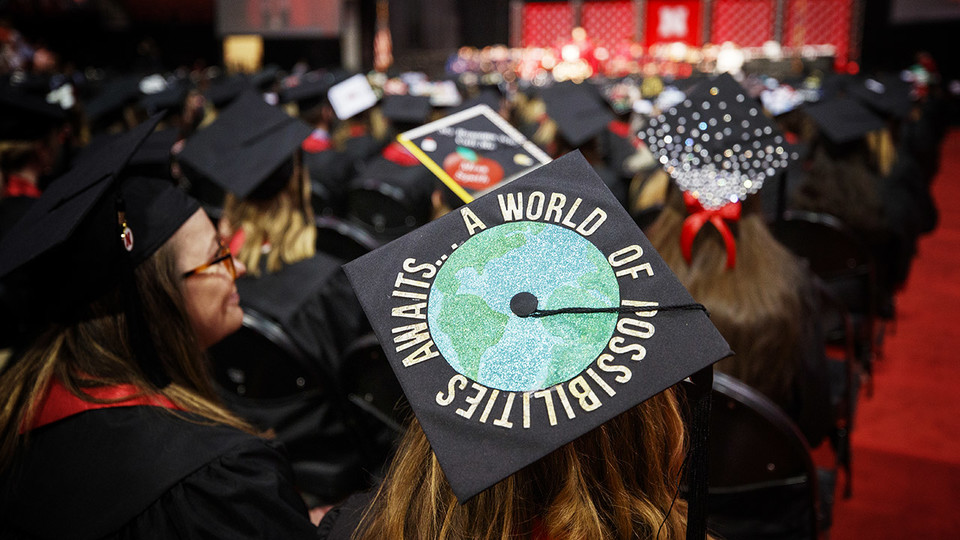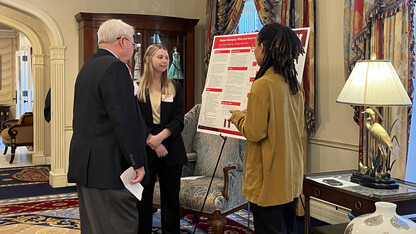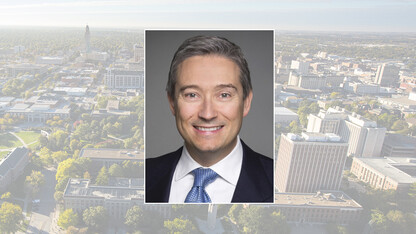· 4 min read
Rural Poll shows mixed opinions on higher education

Rural Nebraskans are confident that higher education can lead to a good job, according to the 2019 Nebraska Rural Poll.
While 70% of respondents to the Rural Poll — the largest annual poll of rural Nebraskans’ perceptions on quality of life and policy issues — agree that a high school diploma can lead to gainful employment, more agree that an associate degree (82%) or bachelor’s degree (77%) can lead to a good job.
In addition, most rural Nebraskans surveyed believe their education was worth the financial cost and that it taught them important skills. Sixty-two percent of respondents agree that their education was worth the cost and 74% agree that they learned skills that they use in their day-to-day life. In fact, those with the highest education levels were most likely to agree with those statements: 74% of persons with at least a four-year college degree agree that their education was worth the cost and 84% agree that they learned useful skills.
However, this year’s poll shows mixed results in how rural Nebraskans regard higher education, mirroring national trends. Those surveyed are less likely to see the importance of a college education today than they did four years ago.
Fifty-three percent of rural Nebraskans surveyed agreed in 2015 that increasing the number of people who get college degrees is necessary to build a strong economy. However, only 33% agree with that statement this year. The proportion agreeing that getting a college education today is more important than it was 10 years ago declined from 70% in 2015 to 44% this year. And those agreeing that to get ahead in life, it is necessary to get a college education decreased from 65% to 38%.
Current economic conditions may account for some of these differences, according to Brad Lubben, extension associate professor and policy specialist at the University of Nebraska–Lincoln.
“In a tight job market like we now have, employers may be happy just to have a good candidate, so the extra value of having a degree with higher skills or qualifications may not be rewarded or immediately noticeable,” Lubben said.
Rural Nebraskans also see value in apprenticeships. Ninety-four percent of those surveyed are confident that completing an apprenticeship program can lead to a good job and 84% agree that apprenticeships should be promoted as an alternative to higher education for getting a good job.
Some of the declines in the perceived importance of higher education may be attributed to how people think about the affordability of higher education and the value of college degrees, according to Becky Vogt, survey research manager for the Rural Poll. Seventy percent of respondents disagree that getting an education after high school is affordable for most people. While 42% agree that most people who enroll in higher education see a return on their investment, 27% disagree. Forty-seven percent agree that college degrees aren’t worth as much as they used to be and 26% disagree.
“We can’t say definitively what caused these shifts in opinions, especially since higher education leads to higher median incomes and most rural Nebraskans see the value of their own education,” said Jason Weigle, associate extension educator with Nebraska Extension. “Colleges and universities may need to engage with their alumni to learn more about the return on investment of their degrees, particularly their cost-benefit tipping point, and how this can be improved.”
This year’s Rural Poll was sent to 6,260 households in 86 Nebraska counties in March and April. Responses were received through June 10. Results are based on 1,776 responses, a response rate of 28%. The margin of error is plus-or-minus 2%. View complete results.
The university’s Department of Agricultural Economics conducts the poll with funding from Nebraska Extension and the Nebraska Rural Futures Institute.







